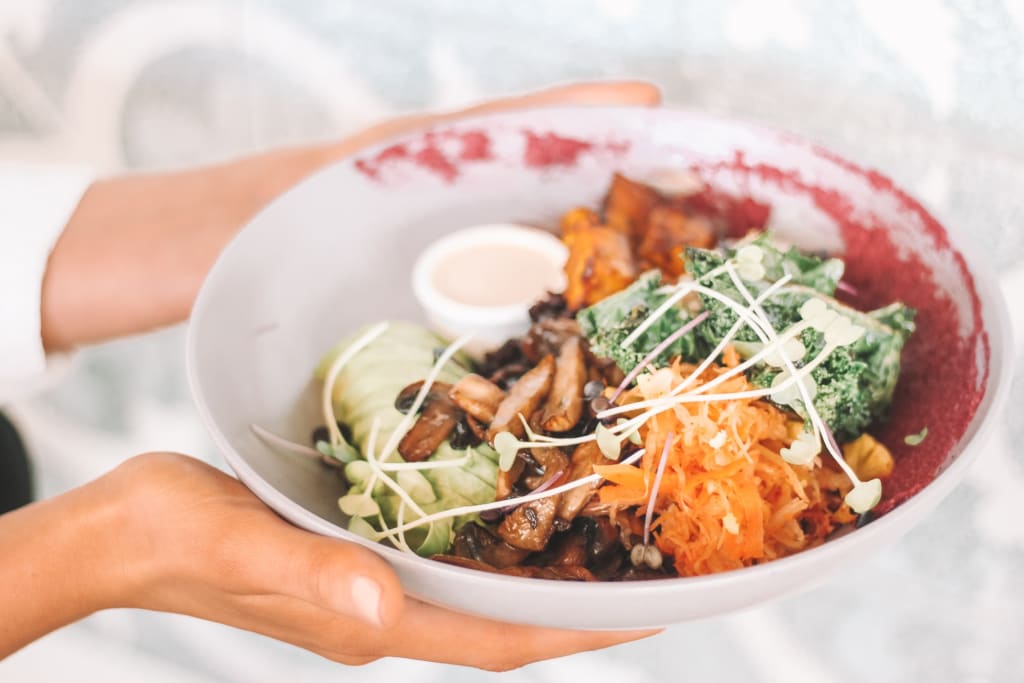The carbs controversy: Should we eat them, or should we not?
People are scared of carbs! This is partly due to the ketogenic diets popularity and the fact that some scientists label sugar as the main reason behind obesity.

There are beliefs that you shouldn’t eat carbs in the morning. Some personal trainers and dietitians say that you shouldn’t eat carbs at night. Keto and paleo followers state that you shouldn’t eat carbs at all. But, why?
How carbs can make you gain weight and feel hungry?
Carbs retain water. Too massive carbs consumption can make you bloated. If you’re interested more in how you look rather than your body composition, carbohydrates might be helpful. For example, many bodybuilders drastically reduce their carbs intake before the competition to get as shredded as possible.
Another reason why people who try to lose weight are afraid of carbs is that naked carbs can make you feel hungry soon after you eat them. By “naked,” I mean that you eat your dried fruits, rice porridge, white bread, sugary cereals, or soft drinks alone, without adding protein or fats sources that would keep you satiated. By “fast,” I mean carbs that are quickly digested as they don’t have too much fiber in them.
Summing up, eating too many refined carbs can make you look like you’ve gained weight because of water retention. Processed carbohydrates can also increase your hunger levels as they are very quickly digested.
Why do low-carb diets work?
Diets that are very low in carbs can make you lose weight rapidly, especially during the first weeks of dieting. In the first days, all the extra water is flushed away from your body. After that, you start to lose fat. One of the explanations why fat loss happens is that, as you almost eliminate the entire food group, you get into a calorie deficit.
For some people, the fat loss on a low-carb diet is more comfortable compared to low-calorie diets. They feel less hunger as fats are pretty satiating. Why it’s not the case with carbs? Because when you eat highly processed carbs, your pancreas produces insulin. It affects your blood sugar levels, making them spike and crash. When your blood sugar goes down after a rapid rise, you feel hunger, even if you just had a large bowl of sugary cereal or a whole pack of potato chips.
When you don’t eat highly processed carbs, you simply don’t have these sugar crashes, and it’s easier for you to eat according to your calorie needs without overeating.
There is one more scientific explanation for why processed carbs are so inefficient in keeping you satiated. Insulin, which is released in response to processed carbs, suppresses glucagon. The latter is a hormone that, according to some studies, induces satiety and keeps you away from overeating.
Why are low-carb diets unsustainable (for most people)?
Let’s assume you’ve managed to get through the transition phase when your body learns to use fats and protein as quick energy sources instead of carbs. What’s next? Will you be able to avoid carbs for the rest of your life?
The thing is people like the combination of carbs and fats. This is just our brain, and it doesn’t care about your weight goals or willpower. It wants dopamine! And one of the easiest ways to get it is by forcing you to gorge on a cake, a pizza, or a chocolate bar. The huge desire of your brain for something sweet stands behind most of the binges and breakdowns that are so frequent among people who follow a low-carb diet.
Most nutritionists and personal trainers agree that you should choose diets and workout routines that you can stick to. If we’re talking about massive weight loss, you have to understand that it is a marathon and not a sprint. Weight loss is a process where slow and steady wins the race.
Are all carbs created equal?
First of all, you should know that carbs consist of three groups. These are fiber, starches, and sugars.
You get fiber from most fruits (apples, pears, oranges), berries (cherries, blueberries, strawberries), and vegetables (cabbage, broccoli, cauliflower, tomatoes). Fiber fills your stomach. What’s more, it slows down the digestion of carbohydrates, so your pancreas doesn’t produce as much insulin as it would in response to highly processed carbs that don’t contain fiber.
You get starches from most of the root vegetables (potato, sweet potato, beetroot, carrot), grains (oats, rye, wheat, semolina), and legumes (beans, lentils, peas). Starches are highly satiating, especially when you consume them with other macronutrients. If we’re talking about vegetables, legumes, and whole grains, they’re usually also rich in fiber, so your insulin doesn’t spike that much.
Sugars are found in dried fruits, fructose syrup, agave syrup, honey, and table sugar. This is where the main problem with carbs lies. Your pancreas reacts the most to the processed carbs with no fiber. It releases a lot of insulin which then drops and makes you even hungrier than before eating a candy or a rice pudding.
If you talk to a dietitian asking for weight-loss advice, the chances are they will recommend you to minimize your added sugar consumption.
So, how much carbs should you consume?
Disclaimer: As we all have different body needs and health issues, this is a type of question you should better ask your health provider.
If you have no health conditions that should be considered and just want to optimize your nutrition, this is what might work for you:
Get at least one gram of fats for one kilo of your bodyweight if you’re a female. This will help you maintain a hormonal balance.
Get from 0,8 to 1,6 grams of protein per one kilo of bodyweight. Keep closer to the recommended maximum if you’re working out and want to maintain or grow your muscle mass.
The rest of the calories can be given to carbs!
If we put it on an example of a 60-kilo woman, she will need 60 grams of fats. Let’s assume she is an athlete. In this case, she will need 96 grams of protein. Together, these are only 924 calories. Let’s consider this woman’s maintenance level is 2,000 calories. This means that to get her calories for a day, she will need to eat 269 grams of carbs which is a bit more than 50% of her daily calorie intake. If she wants to lose weight while maintaining her muscles and hormonal balance, one working strategy would be to reduce the carbs she consumes.
Summing up
Carbs are an essential part of most products we have. They’re contained in fruits and vegetables, which are a great source of fiber, vitamins, and minerals. They’re a quick source of energy and a great tool that can add joy to your meals. However, not all carbs are created equal. Along with satiating starches, natural sugars from fruits, and fiber from vegetables and grains, there is added sugar.
There might be no need to cut all the carbs altogether, but decreasing your sugar consumption a bit might be a working strategy if you want to optimize your nutrition and improve your health.







Comments
There are no comments for this story
Be the first to respond and start the conversation.